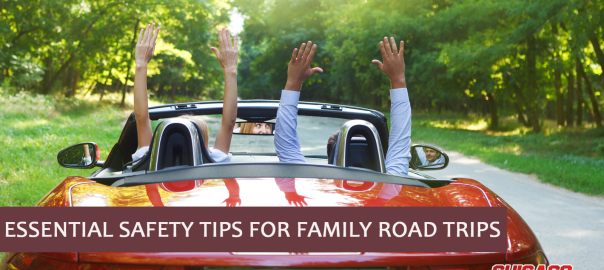If you’re getting ready to embark on a long, family road trip, it’s best to ensure safety – and pleasure – if you develop and act on a checklist that you follow prior to leaving. In this blog post, I’ll list a number of the criteria that I’ve developed on my own checklist before a family vacation last summer. Feel free to add as you go – this list simply acts as a great initial structure to follow which will take care of all the safety essentials. Here we go.
Tip One – Keep your Phone Book Full
Make sure to program a bunch of contacts into your phone before leaving on your trip. You want to be able to have all the phone numbers of your family, doctors, neighbors, and even tow truck companies that you might need to reach in the event of an emergency.
Tip Two – Keep your Cell Phone on Hand
Make sure to always carry your cell phone, maps, and GPS navigation system with you during the entire course of your trip. Additionally, research the route you’re taking before you leave, so that you know you have the proper directions. It will save you alot of last minute ground work.
Tip Three – Make sure your vehicle is Happy
Before leaving, check the fluid levels of your vehicle, and inspect its tires, hoses, and belts. You want to be certain that all aspects of your car are working correctly before you leave, so there’s no nasty surprises. If you get stuck on the road always have an emergency number for an expert roadside assistance company.
Tip Four – Back up Car Gear
In the event of an automobile malfunction, you want to be prepared. Make sure to bring an inflated spare tire with you, as well as a jack and a lug wrench – you would need both these tools in the event of a tire blowout, or a damaged tire.
Tip Five – Make sure your tires are full.
You’re going to want to check the air pressure of all 4 of your tires, according to the specifications in your vehicle’s owner’s manual. Driving with under-pressured tires can result in dangerous sidewall blowouts, and a level of poor traction that can make drivers totally lose control of their cars.
Tip Six- Gear for Light and Darkness
Always carry a flashlight and flare. If you’re stranded on a dark road this can be a lifesaver. Additionally, make sure to carry protective eye gear like sunglasses.
Tip Seven – Emergency Provisions
Always carry at least a gallon of drinking water, a bottle of aspirin or ibuprofen, a warm blanket, any eye-drops you may need, a roll of paper towels, a change of clothes, a warm sweatshirt or jacket, and any medication that you might take,
Tip Eight – Mind your Body’s Clock
It’s important to get at least 8 hours of good restful sleep before embarking on your trip. This ensures that you’re alert, awake, and have the ability to drive safe, with full awareness of the traffic around you. This will help prevent any of the careless mistakes that often result in accidents for driver’s that can’t maintain a level of steady alertness on the road.

